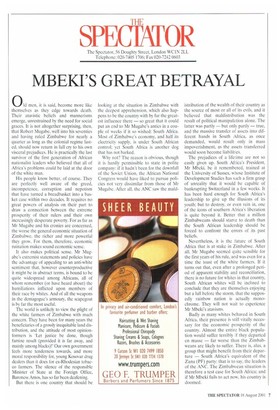MBEKI'S GREAT BETRAYAL
Old men, it is said, become more like themselves as they edge towards death. Their atavistic beliefs and mannerisms emerge, unrestrained by the need for social graces. It is not altogether surprising, then. that Robert Mugabe, well into his seventies and having ruled Zimbabwe for nearly a quarter as long as the colonial regime lasted, should now return in full cry to his own visceral prejudices. He is practically the last survivor of the first generation of African nationalist leaders who believed that all of Africa's problems could be laid at the door of the white man.
His people know better, of course. They are perfectly well aware of the greed, incompetence, corruption and nepotism that have turned a breadbasket into a basket case within two decades. It requires no great powers of analysis on their part to draw a connection between the extreme prosperity of their rulers and their own increasingly desperate poverty. For as far as Mr Mugabe and his cronies are concerned, the worse the general economic situation of Zimbabwe, the richer and more powerful they grow. For them, therefore, economic ruination makes sound economic sense.
It also makes political sense. Mr Mugabe's extremist statements and policies have the advantage of appealing to an anti-white sentiment that, however counterproductive it might be in abstract terms, is bound to be quite widespread among Africans, all of whom remember (or have heard about) the humiliations inflicted upon members of their race by whites. And of all the weapons in the demagogue's armoury, the scapegoat is by far the most useful.
The world is unlikely to view the plight of the white farmers of Zimbabwe with much concern. They have been for many years the beneficiaries of a grossly inequitable land distribution, and the attitude of most opinionformers is 'Let justice be done, though famine result (provided it is far away, and mainly among blacks)!' Our own government feels more tenderness towards, and more moral responsibility for, young Kosovar drug dealers than it does for ex-Rhodesian tobacco farmers. The silence of the responsible Minister of State at the Foreign Office, Baroness Amos, has so far been deafening.
But there is one country that should be looking at the situation in Zimbabwe with the deepest apprehension, which also happens to be the country with by far the greatest influence there — so great that it could put an end to Mr Mugabe's antics in a couple of weeks if it so wished: South Africa. Most of Zimbabwe's economy, and half its electricity supply, is under South African control; yet South Africa is another dog that has not barked.
Why not? The reason is obvious, though it is hardly permissible to state in polite company: if it hadn't been for the downfall of the Soviet Union. the African National Congress would have liked to pursue policies not very dissimilar from those of Mr Mugabe. After all, the ANC saw the maid istribution of the wealth of their country as the source of most or all of its evils, and it believed that maldistribution was the result of political manipulation alone. The latter was partly — but only partly — true, and the massive transfer of assets into different hands in South Africa, as once demanded, would result only in mass impoverishment, as the assets transferred would soon become liabilities.
The prejudices of a lifetime are not so easily given up. South Africa's President, Mr Mbeki, be it remembered, trained at the University of Sussex, whose Institute of Development Studies has such a firm grasp of unreality that it would be capable of bankrupting Switzerland in a few weeks. It has been hard enough for South Africa's leadership to give up the illusions of its youth: but to destroy, or even rein in, one of the icons of southern Africa's liberation is quite beyond it. Better that a million Zimbabweans should starve to death than the South African leadership should be forced to confront the errors of its past beliefs.
Nevertheless, it is the future of South Africa that is at stake in Zimbabwe. After all, Mr Mugabe seemed quite sensible for the first years of his rule, and was even for a time the toast of the white farmers. If it turns out that, even after a prolonged period of apparent stability and reconciliation, there is no future for whites in that country, South African whites will be inclined to conclude that they are themselves enjoying but a lull before the storm, that the supposedly rainbow nation is actually monochrome. They will not wait to experience Mr Mbeki's atavisms.
Badly as many whites behaved in South Africa, their presence is still vitally necessary for the economic prosperity of the country. Almost the entire black population would suffer terribly if they departed en masse — far worse than the Zimbabweans are likely to suffer. There is, alas, a group that might benefit from their departure — South Africa's equivalent of the Zanu (PF) party: that is to say, the leaders of the ANC. The Zimbabwean situation is therefore a test case for South Africa; and if Mr Mbeki fails to act now, his country is doomed.


























































 Previous page
Previous page